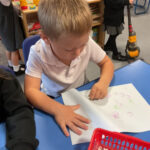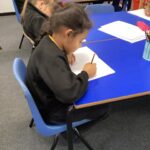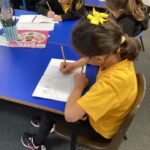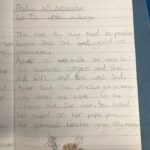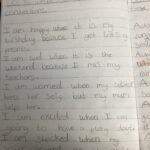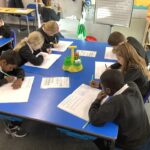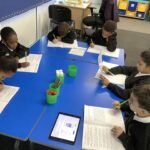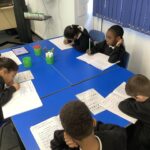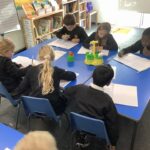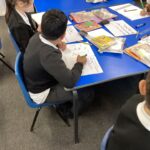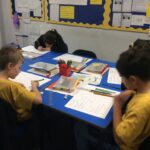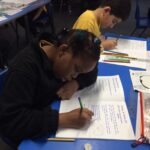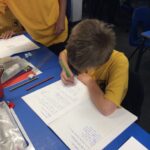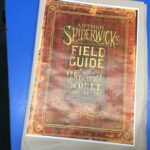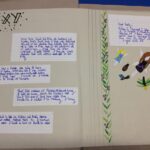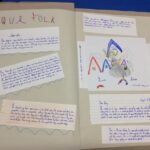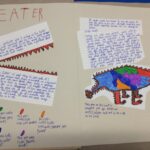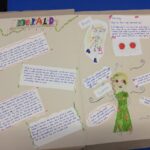At Longlands we follow the National Curriculum for English which aims to raise standards of reading, writing and spoken language for all children. We also follow a structured programme of phonics called ‘Little Wandle – Letters and Sounds Revised’ and include Guided Reading to teach reading techniques. In Key Stage Two we use a programme called Accelerated Reader to help track, monitor and improve reading.
Writing Intent
The purpose of writing, as part of the curriculum, is to provide the children with many life skills. A high-quality English education will engage, inspire and challenge pupils, equipping them with the knowledge and skills to experiment, invent and be creative in their own writing. As pupils progress, they will be able to think critically and develop a more rigorous understanding of English. The intention is that children learn to justify ideas with reasons; ask questions to check understanding; develop vocabulary and build knowledge; negotiate; evaluate, edit and build on the ideas. They will then be able to clarify their thinking as well as organise their ideas for writing in a variety of real life situations. The children will take pride in their work, develop a love of writing and most importantly, be equipped for the rest of their education.
Reading Intent
Our fundamental aim is to teach every child to read fluently, as quickly as possible, and be enthused about reading. We strive to teach children to read accurately and fluently with good comprehension, as well as develop the habit of reading widely and often, for both pleasure and information. These essential skills not only unlock doors to the rest of the curriculum, but also have a huge impact on children’s self-esteem and future life experiences.
Reading is the key that unlocks the whole curriculum so the ability to efficiently decode is essential. Early reading sessions are expected to occur each day with no exceptions, as the continuity and pace of the programme is key to accelerating the progress of children’s reading development. Guided reading is a focus across the school. Once fluent readers, pupil’s engage in at least 15 minutes of independent reading a day.
English
A typical English lesson involves, discussion, reading and writing for the whole class and small groups, as well as individual and paired activities. Our aim is to ensure that key English skills are taught across the curriculum as well as in standalone lessons.
Reception
Children participate as speakers and listeners during all sessions. Language is developed and improved by talking, discussion, exchanging ideas and experiences.
Children engage in a variety of activities to promote the learning of phonics and we follow the ‘Little Wandle’ programme starting at phase 2. Children also experience a range of different reading genres e.g. fairy stories, non-fiction text, rhyme and recounts.
Children are encouraged to read to their parents on a daily basis.
General literacy activities take place inside and outside and can include: games, writing for different purposes, role play, chalking, puppets, jigsaws, computer programs, sand and water play.
Key Stage One
In the Key Stage One classes, the children engage in a variety of whole class and small group activities including guided reading, writing, phonic work, spellings, vocabulary and grammar. Children learn to recognise pronounceable sequences of letters within words and to acquire a range of strategies in order to decode unfamiliar words. They progress through a range of reading books carefully matched to the Little Wandle Phonics Scheme.
Towards the end of Year One pupils are using the Phonics Screening Check. During the Phonics Screening Check, children are asked to read (decode) 40 words on a one to one basis with their class teacher. Most of these words are real words but some are pseudo-words. Pseudo-words are included to ensure that children are using their decoding skills and not just relying on their memory of words they’ve read before.
Within Literacy, children are encouraged to tell their own stories, to predict what might happen next, to describe experiences and be able to put their stories in sequential order.
Handwriting skills are continuing to be developed through regular practice and are based on the Nelson Scheme for handwriting.
Key Stage Two
In lower Key Stage Two, the English lessons build upon the foundation of skills learnt in Key Stage One and extends the range of fiction and non-fiction texts which the children are exposed to. There is also a continual drive to improve vocabulary and new grammar, as well as language and the application of spelling rules and patterns.
Other aspects of English are regularly reinforced outside the daily lesson and these include guided reading, discrete spelling, grammar and handwriting sessions. Quiet reading of around 15 minutes each day is timetabled to support the Accelerated Reader programme.
The focus of the whole class part of the English Lesson at the upper Key Stage Two includes examining the style and organisation of a text, as well as how the author’s use of language to create feelings and moods and sentence structure. There is a range of grammar work to be revised and some new grammar to learn. Spelling patterns, rules and exceptions are taught, revisited and applied within all lessons.. Drama and performing skills are practised, and time is given for handwriting and individual reading. interventions include pre-teaching and over learning skills where necessary.
The range of texts continues to widen and non-fiction texts continue to be used and the children look at the purpose and uses of all types of writing. This leads up to the National Curriculum Tests, more commonly known as SATs, at the end of Key Stage Two.
- EYFS learner
- EYFS learner
- EYFS learner
- KS1 learner
- KS1 learner
- KS1 presentation
- KS1 presentation
- KS2 learners
- KS2 learners
- KS2 learners
- KS2 learners
- KS2 learners
- KS2 learners
- KS2 learners
- KS2 learners
- Published work
- Published work
- Published work
- Published work
- Published work

